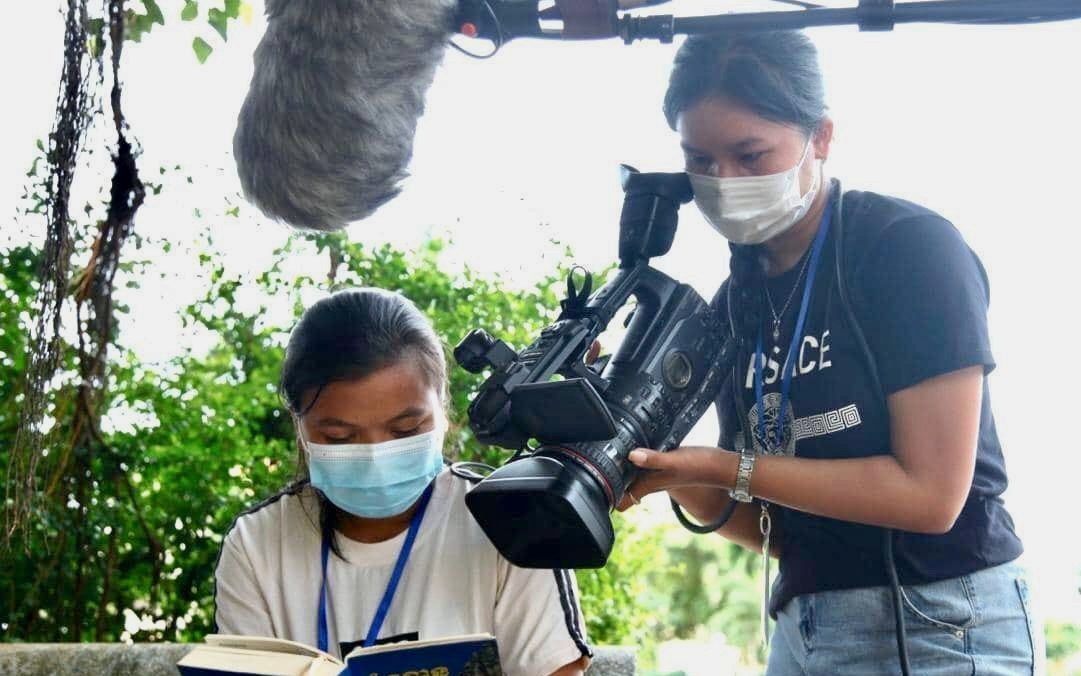Eleven young indigenous filmmakers will showcase short films on their culture, language and hurdles facing their communities at a Phnom Penh film festival that starts Wednesday.
The Cambodia International Film Festival was inaugurated Tuesday evening and will screen movies starting Wednesday morning at venues across the capital after a two-year hiatus due to the Covid-19 pandemic. The festival runs until Sunday, with a scheduled roster of events and screenings of Cambodian and international films and documentaries.
Kicking off the festival will be a showcase of short films from indigenous filmmakers who have been training at the Bophana Center, an organization that archives audiovisual material from Cambodia.
The 11 filmmakers have been trained in camera work, audio recording and other technical skills over the past year. As part of that, they have filmed documentaries about issues faced by their communities, such as early marriage for women and how their lives differ from other communities in the country.
Nhoch Seeyean is a 19-year-old filmmaker from Ratanakiri’s Tampoun indignenous group. She will screen a 14-minute movie “Sanoung,” which means food in the Tampoun language.
Seeyean produced the film in this indigenous language, explaining the idea for the project originated from “annoying” questions she often gets about her community’s food and eating habits.
“Some of my friends wondered and asked me, do we eat raw meat for food? So this film is to explain to them that we don’t eat raw meat,” Seeyean said.
The filmmaking training helped Seeyean not only learn sound recording, camera setup, storytelling and editing but also gave her an opportunity to tell a story that is important to her.
“It is very important for me because I’m afraid that my culture, tradition and language will be lost. Through my observation these days, some culture has already been lost and some is partly remaining,” Seeyean said.
Research released in April by youth and women empowerment group Women Peace Makers showed that young women from indgenous communities had a high sense of pride about their identities but faced discrimination for their practices and beliefs. Most respondents said they were worried about losing their language and culture.
Kasal Sinuon, 24, is from Ratanakiri’s Keh Chung commune in Bakeo district. The fledgling Jarai filmmaker chose to document a family of seven whom she saw as a reflection of larger community themes of drugs, alcohol and domestic violence.
The documentary follows a woman married to a man with a drinking problem and charts her life dealing with her partner and five kids while earning an income for the family. Sinuon said that while her movie followed a family from the community, it was a story that can be seen anywhere in society.
She is currently studying development at the Royal University of Phnom Penh but wants to use her new skills to tackle another issue in her community.
“Marriage at an early age for a girl can be very challenging. It affects their health and their future, and they can’t study further,” Sinuon said.
Chea Sopheap, the executive director of Bophana Center, said it was crucial to arm indigenous youth with the skills to document their cultures, which were fast dying out, and to do it in their languages.
He said some indigenous communities were seeing their language regress day-to-day. Documenting and archiving the filmmakers’ stories would help preserve some of the culture, Sopheap said.
Besides that cultural benefit, he added that about 90% of students who complete the center’s yearlong program have found jobs in the film industry.
“Now they all have their own jobs. Some are working as filmmakers, a video editor, and some are working as production coordinators,” he said. “They have stable jobs and money, some send money home and some have the opportunity to continue their studies.”
Screenings of films and documentaries begin Wednesday morning. A schedule can be found here and additional information is on the festival website.













